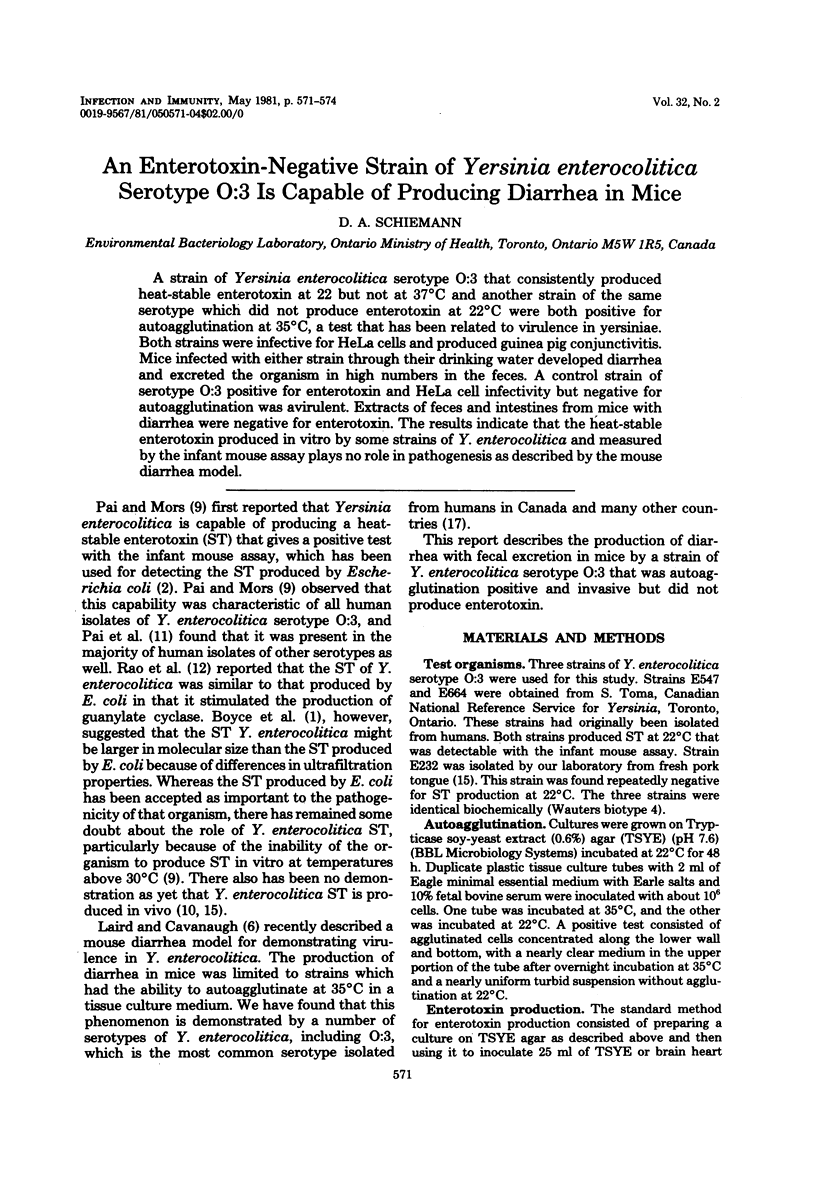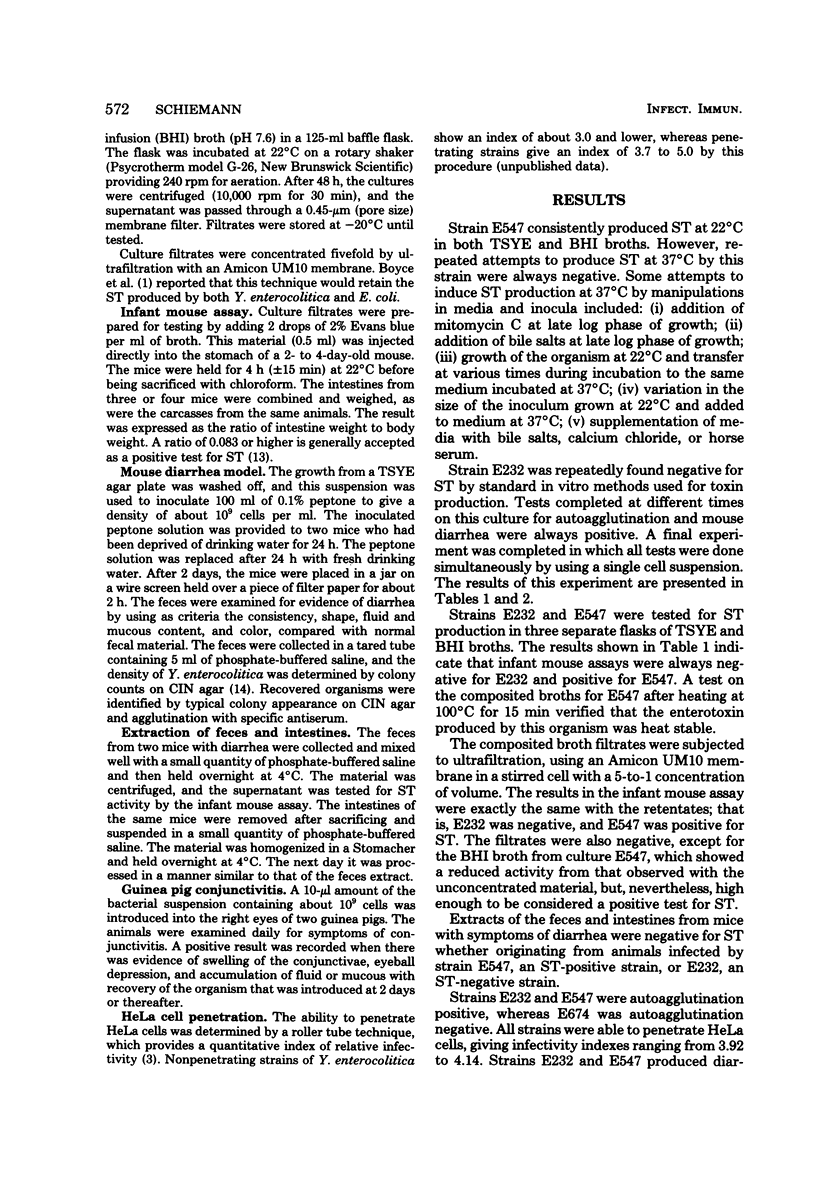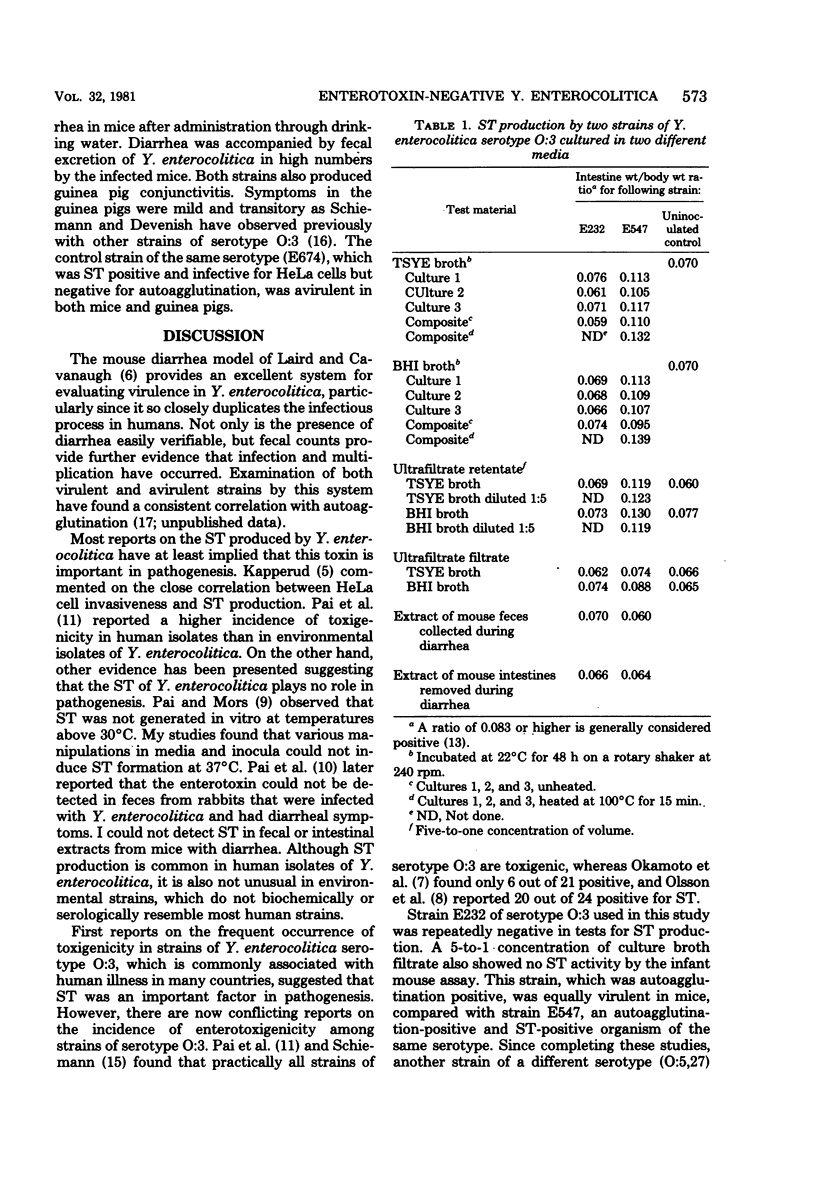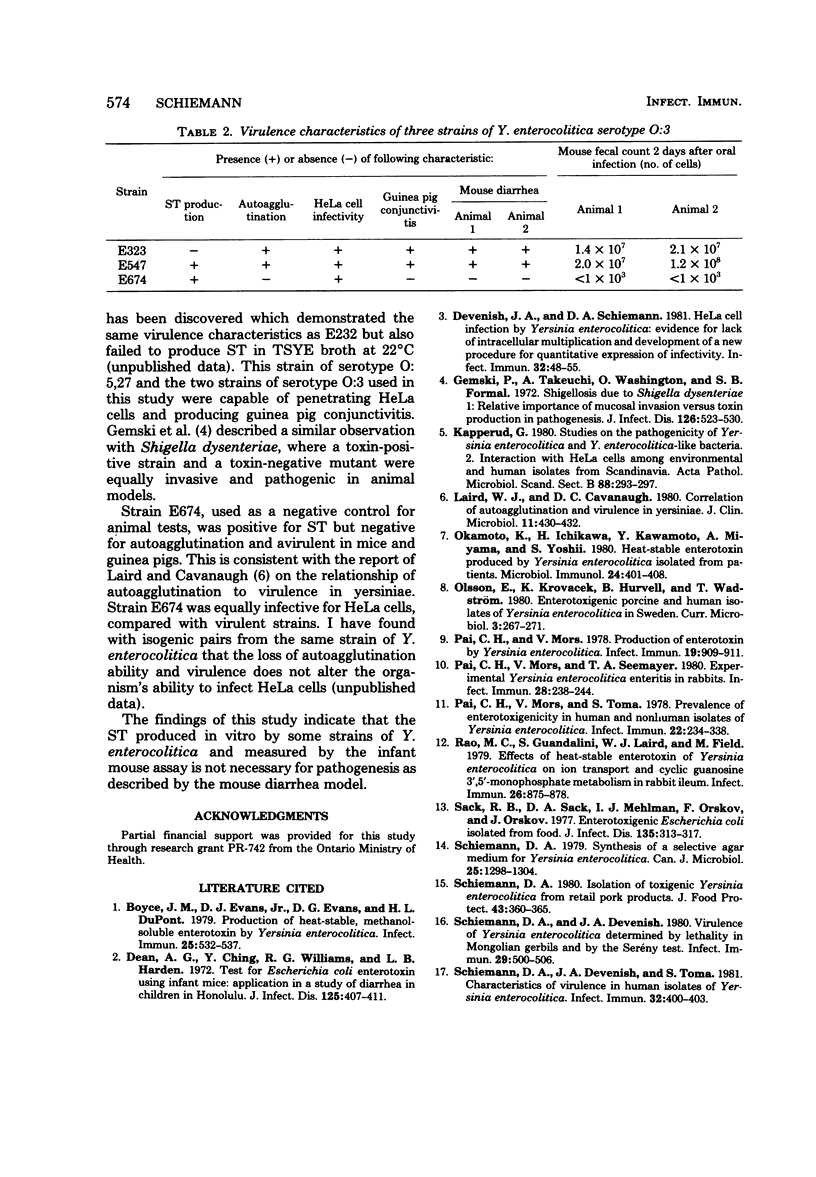Abstract
A strain of Yersinia enterocolitica serotype O:3 that consistently produced heat-stable enterotoxin at 22 but not at 37 degrees C and another strain of the same serotype which did not produce enterotoxin at 22 degrees C were both positive for autoagglutination at 35 degrees C, a test that has been related to virulence in yersiniae. Both strains were infective for HeLa cells and produced guinea pig conjunctivitis. Mice infected with either strain through their drinking water developed diarrhea and excreted the organism in high numbers in the feces. A control strain of serotype O:3 positive for enterotoxin and HeLa cell infectivity but negative for autoagglutination was avirulent. Extracts of feces and intestines from mice with diarrhea were negative for enterotoxin. The results indicate that the heat-stable enterotoxin produced in vitro by some strains of Y. enterocolitica and measured by the infant mouse assay plays no role in pathogenesis as described by the mouse diarrhea model.
Full text
PDF



Selected References
These references are in PubMed. This may not be the complete list of references from this article.
- Boyce J. M., Evans E. J., Jr, Evans D. G., DuPont H. L. Production of heat-stable, methanol-soluble enterotoxin by Yersinia enterocolitica. Infect Immun. 1979 Aug;25(2):532–537. doi: 10.1128/iai.25.2.532-537.1979. [DOI] [PMC free article] [PubMed] [Google Scholar]
- Dean A. G., Ching Y. C., Williams R. G., Harden L. B. Test for Escherichia coli enterotoxin using infant mice: application in a study of diarrhea in children in Honolulu. J Infect Dis. 1972 Apr;125(4):407–411. doi: 10.1093/infdis/125.4.407. [DOI] [PubMed] [Google Scholar]
- Devenish J. A., Schiemann D. A. HeLa cell infection by Yersinia enterocolitica: evidence for lack of intracellular multiplication and development of a new procedure for quantitative expression of infectivity. Infect Immun. 1981 Apr;32(1):48–55. doi: 10.1128/iai.32.1.48-55.1981. [DOI] [PMC free article] [PubMed] [Google Scholar]
- Gemski P., Jr, Takeuchi A., Washington O., Formal S. B. Shigellosis due to Shigella dysenteriae. 1. Relative importance of mucosal invasion versus toxin production in pathogenesis. J Infect Dis. 1972 Nov;126(5):523–530. doi: 10.1093/infdis/126.5.523. [DOI] [PubMed] [Google Scholar]
- Kapperud G. Studies on the pathogenicity of Yersinia enterocolitica and Y. enterocolitica-like bacteria. 2. Interaction with HeLa cells among environmental and human isolates from Scandinavia. Acta Pathol Microbiol Scand B. 1980 Oct;88(5):293–297. [PubMed] [Google Scholar]
- Laird W. J., Cavanaugh D. C. Correlation of autoagglutination and virulence of yersiniae. J Clin Microbiol. 1980 Apr;11(4):430–432. doi: 10.1128/jcm.11.4.430-432.1980. [DOI] [PMC free article] [PubMed] [Google Scholar]
- Okamoto K., Ichikawa H., Kawamoto Y., Miyama A., Yoshii S. Heat-stable enterotoxin produced by Yersinia enterocolitica isolated from patients. Microbiol Immunol. 1980;24(5):401–408. doi: 10.1111/j.1348-0421.1980.tb02844.x. [DOI] [PubMed] [Google Scholar]
- Pai C. H., Mors V. Production of enterotoxin by Yersinia enterocolitica. Infect Immun. 1978 Mar;19(3):908–911. doi: 10.1128/iai.19.3.908-911.1978. [DOI] [PMC free article] [PubMed] [Google Scholar]
- Pai C. H., Mors V., Seemayer T. A. Experimental Yersinia enterocolitica enteritis in rabbits. Infect Immun. 1980 Apr;28(1):238–244. doi: 10.1128/iai.28.1.238-244.1980. [DOI] [PMC free article] [PubMed] [Google Scholar]
- Pai C. H., Mors V., Toma S. Prevalence of enterotoxigenicity in human and nonhuman isolates of Yersinia enterocolitica. Infect Immun. 1978 Nov;22(2):334–338. doi: 10.1128/iai.22.2.334-338.1978. [DOI] [PMC free article] [PubMed] [Google Scholar]
- Rao M. C., Guandalini S., Laird W. J., Field M. Effects of heat-stable enterotoxin of Yersinia enterocolitica on ion transport and cyclic guanosine 3',5'-monophosphate metabolism in rabbit ileum. Infect Immun. 1979 Dec;26(3):875–878. doi: 10.1128/iai.26.3.875-878.1979. [DOI] [PMC free article] [PubMed] [Google Scholar]
- Sack R. B., Sack D. A., Mehlman I. J., Orskov F., Orskov I. Enterotoxigenic Escherichia coli isolated from food. J Infect Dis. 1977 Feb;135(2):313–317. doi: 10.1093/infdis/135.2.313. [DOI] [PubMed] [Google Scholar]
- Schiemann D. A., Devenish J. A., Toma S. Characteristics of virulence in human isolates of Yersinia enterocolitica. Infect Immun. 1981 Apr;32(1):400–403. doi: 10.1128/iai.32.1.400-403.1981. [DOI] [PMC free article] [PubMed] [Google Scholar]
- Schiemann D. A., Devenish J. A. Virulence of Yersinia enterocolitica determined by lethality in Mongolian gerbils and by the Serény test. Infect Immun. 1980 Aug;29(2):500–506. doi: 10.1128/iai.29.2.500-506.1980. [DOI] [PMC free article] [PubMed] [Google Scholar]
- Schiemann D. A. Synthesis of a selective agar medium for Yersinia enterocolitica. Can J Microbiol. 1979 Nov;25(11):1298–1304. doi: 10.1139/m79-205. [DOI] [PubMed] [Google Scholar]


